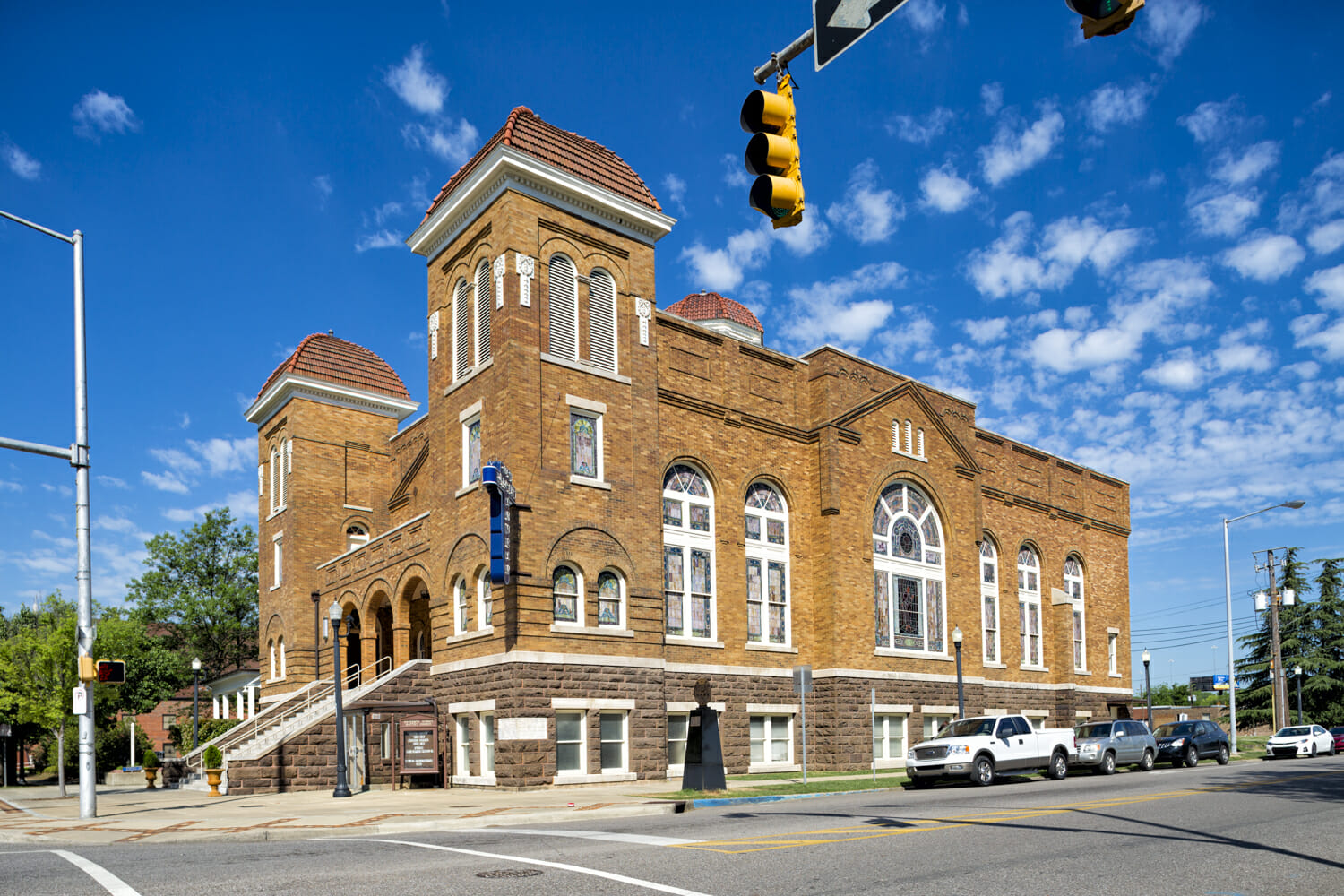
16th Street Baptist Church in Birmingham, Ala.
Let us live the ‘The Birmingham Pledge’
Rev. Alan R. Rudnick
July 30, 2019
As I sat in the church, I wondered what it would be like praying, singing, and worshiping in a church service and being nearly blown to pieces by a bomb. It is a grotesque thought that is based on reality.
I was in Birmingham, Alabama attending the 2019 Cooperative Baptist Fellowship’s Baptist Women in Ministry worship service at the 16th Street Baptist Church. This is the church that was bombed on September 15, 1963, as part of the Ku Klux Klan resistance to the Civil Rights Movement. As the worship service continued, I could not block out thoughts of trying to come to terms with the reality of the tragedy that occurred. The walls and furnishings have been repaired, but how could people repair their lives?
One person in particular has been very public about their work of repairing their life after the bombing of the 16th Street Baptist Church. Carolyn Maull McKinstry was a teenager in the church when the bomb went off. Carolyn was the featured speaker at the worship service during my conference. As she recounted the bombing, she told of losing friends who died in the blast: Denise McNair, Carole Robertson, Addie Mae Collins and Cynthia Wesley. Carolyn shared that she was traumatized after the bombing and suffered from depression for over 20 years.
A number of years ago, upon reflecting on her pain, Carolyn wrote a letter to God. Then, she wrote down what she felt God was saying to her: “Carolyn, I need you to tell people that this is not about skin color or ethnicity or religion. It is about love, it is about forgiveness, it is about reconciliation. I need you to be my messenger, my ambassador. They will know I allowed you to live—I saved you so you could bear personal witness to my power to restore and forgive and draw people to me…Tell them about me. Tell them about Cynthia, Addie, Denise, and Carole. Tell them that when they are reconciled to me, they can be reconciled to each other.”[i]
In 2002, Carolyn was subpoenaed in the State of Alabama vs. Bobby Frank Cherry trial. Bobby was a Klan member involved with the bombing in 1963. During the trial, Carolyn shared her painful memory of the bombing. Afterward, Carolyn chose to forgive those Klan members who killed her friends, which allowed her to move towards personal reconciliation.
Carolyn writes, speaks, and has appeared on the History Channel, CNN, MSNBC, Life Magazine, The Oprah Winfrey Show, and National Public Radio. She shares about her story and her ministry of reconciliation and forgiveness. In her book, “While the World Watched: A Birmingham Survivor Comes of Age During the Civil Rights Movement,” she writes, “The deaths of my four girlfriends left me with a pain I cannot describe. But something beautiful has come of it, and that’s the vision God has given for reconciliation. My passion is to see people learn to work together and appreciate the diversity God created among us. This has become a calling for me, and I think about it all the time.”[ii] Through her work of reconciliation, she has called people to affirm and adhere to “The Birmingham Pledge” that the city of Birmingham has endorsed in order to fight racism and strive for justice. It reads:
- I believe that every person has worth as an individual.
- I believe that every person is entitled to dignity and respect, regardless of race or color.
- I believe that every thought and every act of racial prejudice is harmful; if it is my thought or act, then it is harmful to me as well as to others.
- Therefore, from this day forward I will strive daily to eliminate racial prejudice from my thoughts and actions.
- I will discourage racial prejudice by others at every opportunity.
- I will treat all people with dignity and respect; and I will strive daily to honor this pledge knowing that the world will be a better place because of my effort.[iii]
If Carolyn Maull McKinstry can forgive and work towards reconciliation, can you? By God’s grace, all of us have the capacity to do the repairing work of forgiveness but we also have the capacity to work towards reconciliation, respect, and love. We must repair the brokenness in our culture if we want to have a brighter future. Let us live “The Birmingham Pledge” so that the reparative love of Christ may be active in our church and community.
The Rev. Alan Rudnick is an American Baptist minister, author and Th.D. student at La Salle University, Philadelphia. He is a former member of the board of directors for American Baptist Home Mission Societies, Board of General Ministries and Mission Council of the Cooperative Baptist Fellowship.
The views expressed are those of the author and not necessarily those of American Baptist Home Mission Societies.
Want the latest from The Christian Citizen?
Subscribe to Christian Citizen Weekly

